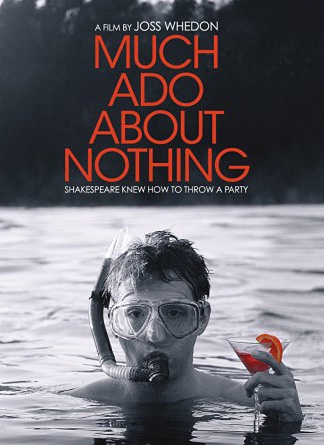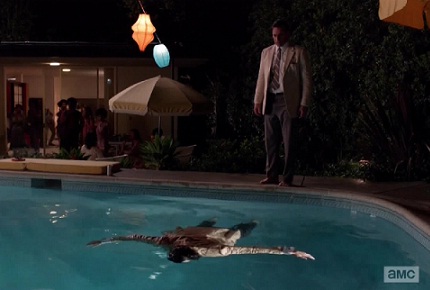Some thoughts about Much Ado About Nothing, which I haven't seen

The other day I saw this poster for Joss Whedon's film adaptation of Much Ado About Nothing, with its tagline, "Shakespeare Knew How To Throw a Party". I'm still throwing up.
I haven't seen the movie yet, and I'm trying to keep an open mind. Critics certainly seem to love it, and I can believe that it's a fun time. But I've been irritated by the whole idea of this movie since the trailer came out, and still have some reservations.
First of all, some marketing firm came up with that idiotic tagline, but Shakespeare and his alleged ability to throw a party shows that those involved in this adaptation think Much Ado is a lighthearted romp. Shakespeare is a blast, kids! Look at all these beautiful young people drinking and carousing in the trailer! It's not like school, it's cool and fun. While it's fine to claim that experiencing Shakespeare is a good time, it assumes that audiences are incapable of appreciating the other enjoyable aspects of Shakespeare: the language, the wise and timeless insights into human nature, the emotions, the jokes.
Also, as much as I respect Joss Whedon and his clever, whimsical style, when I think about filmmakers I would trust with modernizing Shakespeare, I'm not sure he's above #40 on that list. He uses actors that are great for his kind of writing. But hiring the cast of "Angel" and "Dollhouse" to do Shakespeare strikes me as a bad misjudgment. American TV actors are fine for disposable American TV shows with that Whedon-esque snappy dialogue, but they might not bring the gravitas, skill, and confidence you need to pull off Shakespeare.
British director Trevor Nunn once said, "I have yet to see [Much Ado] done with sufficient seriousness." That's because it's not a lighthearted romp, like Whedon's version appears to be--it's actually really dark. The story follows two not-young people (Beatrice and Benedick) who have been through the emotional ringer, and seem to have a kind of romance PTSD. The subplot (Claudio and Hero) is about the world's harshest case of (misguided) slut-shaming, regret, and death. I might be wrong here, but I'll bet that Whedon didn't pick up on any of that in his adaptation. In an NPR interview, he calls the play the basis for all modern romantic comedies. Yeah, the language is a lot of fun, but the themes are dark, dark, dark.
Also, why is it in black and white? The movie was shot in Whedon's own sun-drenched southern California home, so the stark, austere, moody look of black and white seems out of place. I think he did it as an easy way to manufacture a sense of artistic legitimacy. For a certain audience, black and white automatically means "arty and serious", so they'll watch this Joss Whedon movie with second-rate TV actors and think "I'm watching a serious Shakespearean film, it must be good!" and get to feel smart and cultured.
Maybe I'm being too cynical. Critics who like the movie like A.O. Scott have personal preferences that are different than mine; in his glowing review he says, "I prefer my Shakespeare in modern clothing and with American accents." One day, if he's lucky, maybe he'll get to see David Boreanaz's Hamlet!

